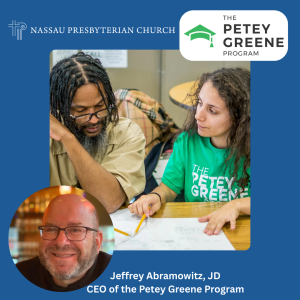Luke 1:46-55
December 21
David A. Davis
Jump to audio
Basking in the glow of last week’s Christmas Pageant, Ingrid Ladendorf (our director of your and children’s choirs) and I were reminiscing about Christmas Pageants in general and Christmas Pageants here at Nassau Presbyterian Church. We discussed the gift of creating Christmas memories here at the church that our youth and children will carry with them forever. How each year the imperfections of the pageant make it perfect. That Christmas Pageants embody the theological affirmation of the incarnation. The perfection of the pageant is in the fleshiness of telling, acting out, performing the story of the birth of Jesus. Ingrid said to me, “I find it very moving to think of all the Marys here at Nassau over the years who memorized “My soul magnifies the Lord and my spirit rejoices in God my Savior, for God has looked with favor on the lowliness of God’s servant.” Year after year, decade after decade, a young woman memorizing the Magnificat and likely never forgetting at least parts of it. That image Ingrid offered helps to cleanse my palate of the image Lauren McFeaters often shared of when she served as an associate pastor at the Ewing Presbyterian Church. The interim pastor who served after David Prince stood in the pulpit on Christmas Eve while wearing a purple scarf on his head with his bearded face, and began his sermon, “I am Mary”.
Growing up in the Presbyterian Church, I never heard much about Mary. I am sure that Luke 2:47-55 was read every Advent and Christmas Eve. But I don’t remember hearing about Mary in sermons. I don’t remember my own sermons, but I am pretty good at remembering others’ sermons. It must have been part of what some biblical scholars have called “The Protestant silence” when it comes to Mary. I do remember hearing those voices of grown-ups around the church talking about Roman Catholics, “you know, they pray to Mary,” which was far from a compliment or an unbiased observation. I heard more about Mary my first week of football practice in college when one of the assistant coaches, who likes to yell a lot, avoided salty language by invoking the name of Mary with one of those memorable Boston accents. “Holy Mary, mother of God.” “Or Mary, Joseph, and Jesus….can someone make a tackle today?” I heard Mary’s name more in those weeks than I ever did growing up. I grew up Presbyterian. Our text for today from the Gospel of Luke, and sung by the choir in just a moment, is the Song of Mary, the Magnificat. Mary, the mother of God. Mary the theotokos. Mary the God-bearer.
In those days, as the bible has it, Mary “went with haste” to see Elizabeth. Like the shepherds who “went with haste and found Mary and Joseph, and the babe lying in the manger”, Mary went with that same kind of expectant intention to find Elizabeth. You know the story: when Mary greeted Elizabeth, John the Baptist saluted with a kick. Elizabeth’s response to Mary comes as she is, according to Luke, “filled with the Holy Spirit.” Just like her own baby John, described by the angel as “filled with the Holy Spirit”, like Elizabeth’s husband Zechariah after he named the child John, he was “filled with the Holy Spirit”. Like all the people on that day of Pentecost who began to speak in other tongues, like Peter rising to speak after his arrest to the elders and scribes assembled in Jerusalem, like Stephen as he was being martyred and he was looking up to heaven, all of them, according to Luke, “were filled with the Holy Spirit.”
Elizabeth was “filled with the Holy Spirit,” and she said with a loud voice, “Blessed are you among women, and blessed is the fruit of your womb….And blessed is she who believed that there would be a fulfillment of what was spoken to her by the Lord.” Elizabeth, filled with the Holy Spirit, said to Mary, “Blessed, blessed, blessed”. Bless your heart Mary, that you would believe that God will fulfill all that God has spoken to you.” Or as it says in the King James: “And blessed is she that believed, for there shall be a performance of those things which were told her from the Lord.”
That’s when Mary speaks, she prays, she sings. That’s when Mary offers her recollection, her rendition of Hannah’s Song from the Hebrew scriptures, those lines so memorized in the collection of Christmas pageants throughout history. “My soul magnifies the Lord and my spirit rejoices in God my Savior, for the Lord has looked with favor upon the lowliness of his servant. Surely, from now on all generations will be blessed.” Blessed. Blessed. The Mighty One. Great things. God’s mercy from generation to generation. Strength in his arm. Scattered the proud in the thoughts of their hearts. The Lord has brought down the powerful from their thrones and lifted the lowly. Hungry filled. Rich sent away. All of it according to the promises God made to Abraham and his descendants forever.
Mary believed. She believed God would do what God promised. She believed that God would fulfill what God had spoken to her. That there would be a performance of what God had said. You have found favor with God. You will conceive and bear a son. He will be great, called Son of the Most High. Of his kingdom, there will be no end. She believed what God said. The Holy Spirit will come upon you. The child to be born will he holy, called the Son of God. Nothing will be impossible with God. She believed in the promise of God. God’s mercy for those who fear the Lord from generation to generation. Strength is shown with the arm of God. Scattering the proud in the thoughts of their hearts. She believed in the performance of God’s promise. The powerful were brought down from their thrones. The lowly lifted up. Hungry filled. Rich empty. All of it according to the promise of God.
If I were to list the most often asked questions of me as a pastor over the last forty years, a few would be at the top. My granddaughter Franny asked me not long ago if God ever sleeps. But a few of the most frequent: “Do you believe in the bodily resurrection?” “Why does the Apostles Creed say ‘he descended into hell’?” “Do you believe in the Virgin Birth?” I confess that I don’t think about the Virgin Birth all that much. When I find myself before the throne of God’s grace in the great bye and bye there among the communion of saints, the great cloud of witnesses, if the Risen Jesus said to me, “Now about that Virgin Birth” thing. My response would be something like “shocked, I say, shocked!” If the whole story of Mary and Elizabeth and Gabriel and the promise of God can be reduced to an examination of belief in the Virgin Birth, one sort of misses the point. As Cynthia Rigby from Austin Seminary pointed out in an essay on the matter, our questions, our thinking about Mary, all have a way of being “unacceptably inattentive” to the divine artistry of it all. It is not about who does this, who does that, it is about who we are in relationship to Go,d who fulfills, who we are in light of God who is faithful, who we are in response to God for us, God with us.
Rigby pointed out that Protestant thinkers have long identified Mary as the model Christian believer. But Mary was more than that, she argued. For as God-bearer, Mary pushes, gives birth, cradles, nurses, nurtures, rocks, burps, bathes, changes, comforts, the one called Son of God. A believer indeed, as Elizabeth exclaimed. Yet one who also somehow participates in the very work of God. Partnering with God who fulfills. Mary reminds us, Rigby wrote, “it is in particular concrete actions undertaken in particular moments that finite creatures realize their participation in the artistry of God….What is impossible is made possible: we are capable, creative, willing, irreplaceable companions of the God who claims us in Jesus Christ. We are included….in the artistry of God.” Or in other words, we too are God-bearers.
When I think of Mary, the mother of God, Mary, the God bearer, I wonder what was more difficult for her to believe, that she would have a baby without being intimate with a man, or that both she and her baby would survive beyond childbirth, or that her life was not about to be ruined, or that the weak would be made strong, and the first would be last, and the hungry filled, and the proud scattered? Of course, a virgin birth is impossible. A virgin birth is impossible, but apparently, so is the powerful of this world being brought low, and all the lowly lifted up. Impossible. And the hungry are filled with good things. Impossible. A virgin birth is impossible. So, it would appear, is peace on earth, and poverty being wiped away, and so is doing justice, and loving kindness, and walking humbly with God. Impossible. And forgiveness that expands seventy times seventy, and a Samaritan called good, and turning the other cheek, and giving your coat also, and eating with sinners, and doing unto the least of these, and life rising from death on the third day. Impossible. Because there is nothing on our own that we can contribute to God being faithful. It is God who fulfills.
Years ago, I attended a choral concert that included the premiere of a piece from a composer who had died years before. The conductor turned and explained to the audience that the piece of music basically sat on the shelf of years after the composer’s death. But he said a composition is never finished until an audience hears it, receives it, and experiences it. Until it is performed. The conductor then thanked the audience for completing the piece of music. “And blessed is she that believed, for there shall be a performance of those things which were told her from the Lord.”
I told you last week about the Hunger Offering in November. When the government shutdown was threatening to take support from food insecure people, families, and children, we invited you to not wait until the traditional last Sunday of the month to contribute to the hunger offering. Locally, our Hunger Offering currently supports Send Hunger Packing in Princeton, the Trenton Area Soup Kitchen, and Homefront. The November Hunger offering was double what it typically is. $15,000 in November alone. And yes, your support of the ArmInArm food pantry downstairs has increased significantly as well. “God has filled the hungry with good things”. A performance of the promise of God.
I see it Sunday after Sunday, week after week, Though the proud and powerful and empire continue to run amok, the people of God at Nassau Church hear and receive the very promise of God and are sent out into this cold-hearted world of darkness to not simply bear witness to that promise but make a difference, to participate in that promise, to participate alongside the God who fulfills. “It is in particular concrete actions undertaken in particular moments that finite creatures realize their participation in the artistry of God.” Mary, you, me. God-bearers, hearing, receiving, experiencing afresh the promise of God and somehow, by God’s grace and power of the Holy Spirit, partnering in the very work of God. Pushing. Cradling. Nurturing. Rocking. Proclaiming. Living. It is what it means to be claimed by the gospel promise of Jesus Christ.
A promise not heard is not a promise. A piece of music not heard by an audience remains incomplete.
Mary, you and me. Blessed. Blessed. Blessed. Bless your heart that you believe in and so live for the God who fulfills.
 Join us for an evening with Jeffrey Abramowitz, J.D., CEO of the Petey Greene Program, as he shares his personal journey through the criminal justice system—from his early career as an attorney to his leadership of national nonprofit organizations.
Join us for an evening with Jeffrey Abramowitz, J.D., CEO of the Petey Greene Program, as he shares his personal journey through the criminal justice system—from his early career as an attorney to his leadership of national nonprofit organizations.






